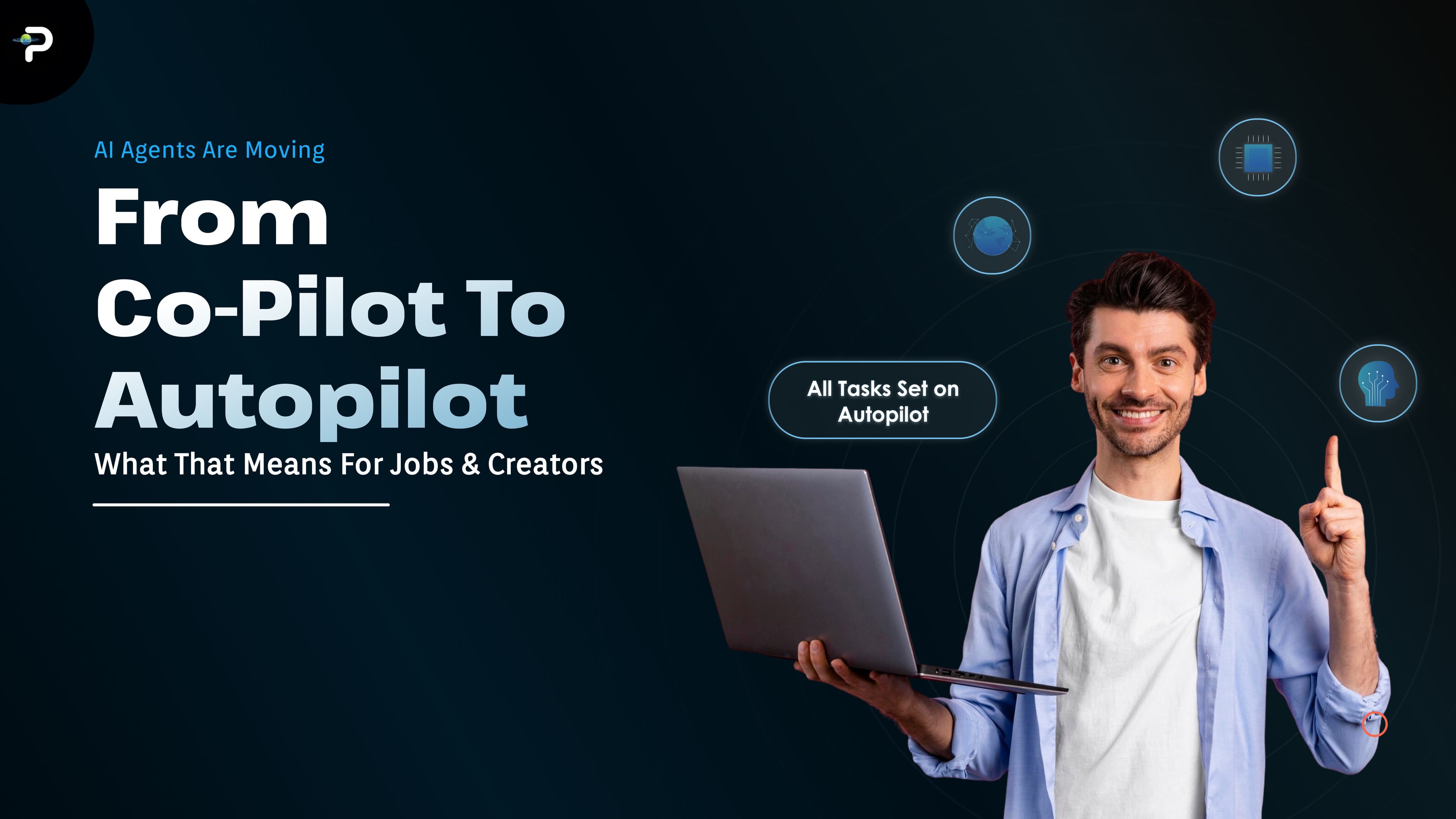So what changes when AI moves from “tell me what to do” to “I’ll get it done”? Let’s break it down for jobs and for creators.
- Co-pilot AI: You stay in charge. It suggests subject lines, drafts posts, completes code, summarizes meetings. You approve.
- Autopilot / agentic AI: You give a goal, “research 5 competitors, draft a deck, send it to the team”, and the AI plans, executes, talks to tools, and reports back. It can browse, call APIs, talk to other agents, and loop till it’s done. This is what newer frameworks like AutoGen, LangGraph, and enterprise agents are enabling.
Most companies today are somewhere in the middle, agents can run parts of a workflow but still need a human to check, approve, or fix context. Full “Level 5” autonomy is still theory.
- Models got better at reasoning, not just spitting text.
- Tools + connectors let AI actually do stuff: send emails, update Notion, query databases.
- Businesses want real ROI, not cute chat, but tasks finished. Agents give that.
Here’s the blunt part: tasks will disappear before jobs do. Agents are great at structured, repetitive, rules-based work, calendar ops, first-level customer replies, data cleanup, report generation. Lots of knowledge workers had 30–40% of their day in those tasks. That slice is what agents will eat first. Some studies are already seeing 25–40% productivity bumps when agents are deployed in research/ops.
So jobs don’t instantly vanish, but job descriptions get rewritten:
- “Marketing executive” → “Marketing operator who oversees AI agents that write, post, A/B test.”
- “Analyst” → “Analyst who designs prompts, validates agent output, and talks to stakeholders.”
- “Support rep” → “Human escalation layer after AI fails.”
The keyword here is orchestration. People who can set goals, pick tools, define guardrails, and review outputs become more valuable, not less. AI still hallucinates, still misses nuance, still lacks accountability. Humans stay the adults in the room.
Every wave of automation creates weird new roles. With agents, expect:
- Agent Ops / AI Operations – people who monitor agent runs, costs, failures.
- Prompt / Workflow Designers – not just “write a prompt,” but “design a 7-step agent loop for content → design → publish.”
- Data / Context Curators – making sure the agent actually has the brand voice, product sheets, pricing, policies. Garbage in, garbage out.
- AI Safety & Compliance – especially when agents can send emails or spend money.
In short, control over AI becomes the job.
This is the spicy part. Creators spent 2023–24 using AI as a booster — generate hooks, scripts, cover art, captions. Now agents can do distribution too: find where to post, post in the right format, repurpose for Shorts/Reels, reply to comments, even pitch brands. That’s an autopilot loop.
So creators get:
- More output for the same energy – daily → multi-daily.
- Multi-platform presence without burnout.
- Faster experimentation – agents can run 10 thumbnail variants while you sleep.
But there’s a catch: when everyone can produce more, volume stops being a moat. The winners will be the ones who keep the human layer:
- personal story
- taste
- cultural timing
- audience trust
AI can write “10 ways AI will change marketing.” It can’t be you talking about how you almost lost a client because AI sent the wrong deck. That human, slightly messy, lived angle will stand out even more.
Be alert, not scared. The pattern is clear in 2025 research: companies want fewer people doing low-value tasks, more people doing judgment work. If your day is 90% copy-paste, you should absolutely be learning to run agents, not compete with them. If your day is stakeholder alignment, selling, negotiating, storytelling — you’re in the safer zone.
A simple rule:
- Tasks that follow rules → agent.
- Tasks that follow relationships → human.
- Learn one agent framework or platform (LangChain/LangGraph, AutoGen, or whatever your company uses).
- Start logging your own workflows and see what’s repeatable.
- Keep a human “signature” in your work — voice, POV, examples.
- Get good at review. The future looks a lot like: agent does 80%, human ships 100%.
Bottom line: AI isn’t just helping anymore, it’s starting to do. The people who thrive won’t be the ones who fight that, but the ones who say: “Cool. You drive. I’ll tell you where we’re going.”




